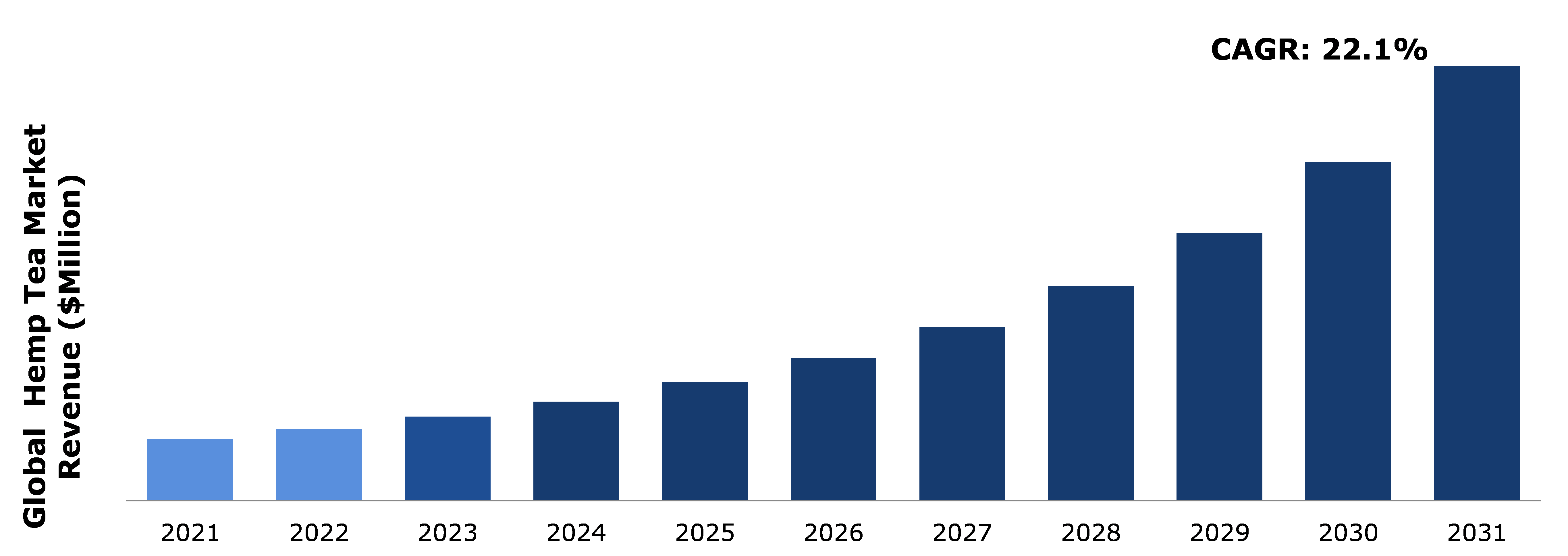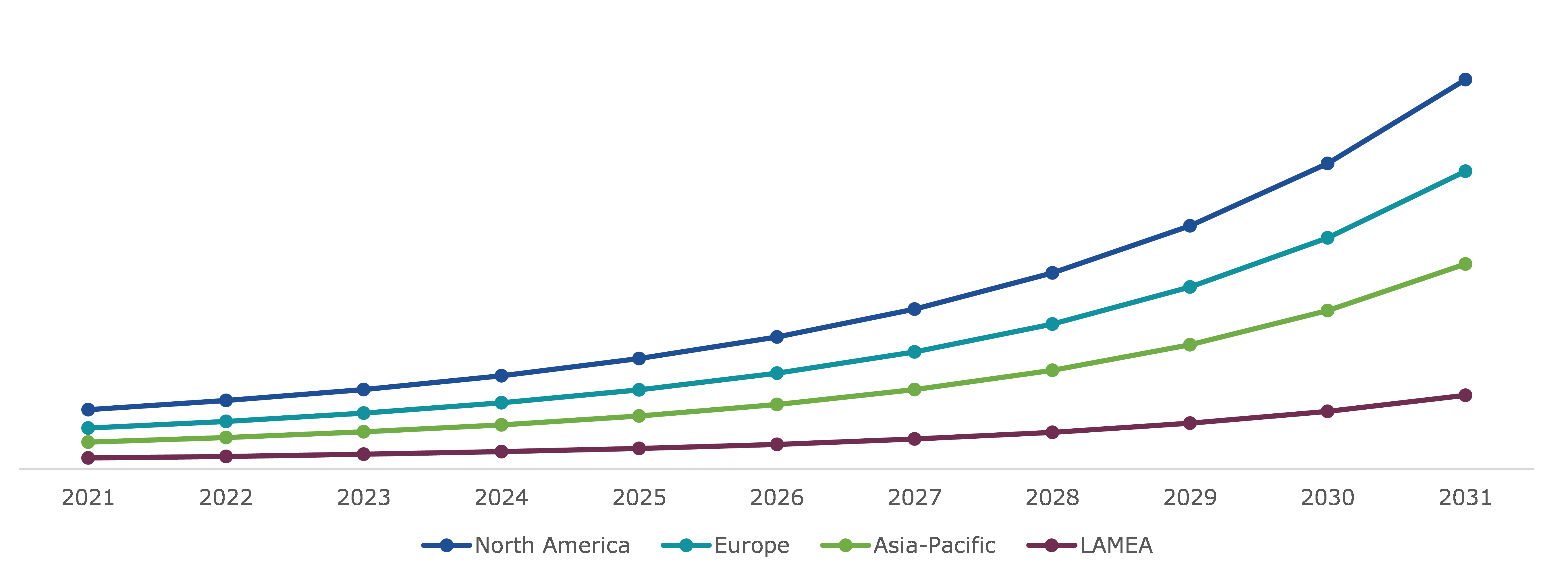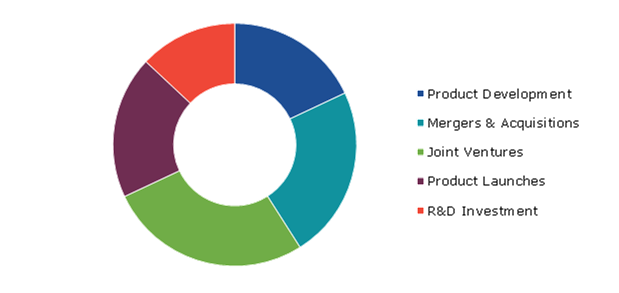Hemp Tea Market Report
RA08498
Hemp Tea Market by Distribution Channel (Online/Direct-To-Consumer, Convenience Stores, and Others) and Regional Analysis (North America, Europe, Asia-Pacific, and LAMEA): Global Opportunity Analysis and Industry Forecast, 2022–2031
Global Hemp Tea Market Analysis
The global hemp tea market size was $ 56,190.0 million in 2021and is predicted to grow with a CAGR of 22.1%, by generating a revenue of $ 392,802.0 million by 2031.
Market Synopsis
Hemp tea is an energizing herbal beverage produced from various hemp plant parts, including the stems, leaves, flowers, and buds. Due to its potential of providing anti-inflammatory, anti-stress, anti-anxiety, and anti-depressive effects, hemp tea is becoming increasingly popular amongst people. The addition of hemp tea in daily diet can increase the tea's overall relaxing effects on a person. The detrimental effects of stress on the body and mind are minimized by the tea’s antioxidant properties. Also, the abundant nutrient content of hemp tea, which includes antioxidants, minerals, and vitamins, further promotes vitality and improves a person's general health. During the forecast period, these factors are anticipated to fuel the hemp tea market expansion.
However, the strict laws enforced by the governments of many nations on the use of cannabis and related products like hemp tea are expected to represent a significant obstacle for the hemp tea industry growth. Many people continue to think that since hemp tea is manufactured from cannabis, it can make them feel intoxicated and high. The market expansion of hemp tea in the upcoming years is likely to be constrained by public misconceptions about the beverage.
During the projection period, the hemp tea market is expected to expand due to the rising popularity of herbal tea among health-conscious consumers worldwide and growing product launches of numerous new flavors of hemp tea by major market players.
According to regional analysis, the North America hemp tea market dominated the market and accounted for the in the projected timeframe. The existence of well-known hemp tea manufacturers in the market and their ongoing attempts to introduce new hemp products including hemp tea flavors are credited with the regional growth. Many businesses have opened their manufacturing facilities and are developing their new hemp tea product lines in North American nations such as the U.S. and Canada, because these nations have permissive regulations regarding the cultivation and use of the cannabis plant in the manufacturing of products such as hemp tea. Such factors are probably going to encourage the hemp tea market expansion in the future.
Hemp Tea Overview
A variety of hemp plant parts, including the buds, leaves, stems, flowers, and seeds, are used to make hemp tea, a form of herbal tea. The hemp tea flavor has a calming aroma and an earthy taste which pleases most of the consumer’s taste buds. When the hemp plant reaches its mature state, hemp tea is collected to supplied to the manufacturers where it is processed and is made ready to consumption for the people. Generally, the collection of hemp tea ingredients is done by the labor manually to make sure that the tea has a high concentration of CBD (cannabidiol) and a good number of antioxidants. Due to rising consumer demand for hemp tea, the hemp tea market has experienced growth in recent years.
Impact Analysis of COVID-19 on the Global Hemp Tea Market
The business sector has been severely impacted by the COVID-19 outbreak worldwide. During the pandemic, there was a significant detrimental impact on the hemp tea market. Governments all around the world have put severe laws and travel restrictions to stop the deadly coronavirus from spreading, which has led to a decrease in the transit and procurement of raw materials to businesses that make hemp products. Due to this aspect, less hemp products such as hemp tea were produced, which caused volatility in market revenue. Additionally, the market expansion of hemp tea was hampered by a lack of manpower in the businesses manufacturing these products. Owing to increased complications brought on by COVID-19, consumers chose not to consume cannabis-derived hemp tea because people believed it might make their corona symptoms worse. The demand for hemp tea products has further decreased because of this factor, which has a negative impact on the market's major players' capacity for production. It is anticipated that these factors will reduce demand for hemp tea during the pandemic.
Increasing Public Awareness Regarding Hemp Tea's Health Benefits is Expected to Drive the Hemp Tea Market Growth
Hemp tea is becoming more popular all around the world. Numerous health advantages of hemp tea include body weight control, anxiety reduction, and depression reduction. Additionally, hemp tea is a great source of vitamins, minerals, and antioxidants that further improve a person's health. Many consumers have been attracted to try and incorporate these new plant-based herbal products in their daily diet plan because of the advantages of hemp tea. The analgesic, anti-inflammatory, and anti-anxiety properties of hemp tea are well established. The antioxidant component present the tea have been seen to improve the tea's general relaxing effects on the person. Hemp tea also has anti-stress properties that lessen the damaging effects of stress on the body and psyche. These elements are anticipated to fuel the hemp tea market growth during the anticipated analysis period.
To know more about global hemp tea market drivers, get in touch with our analysts here.
Strict Rules and Regulations for Commercial Hemp Tea Use Could Restrain the Hemp Tea Market Growth
The cannabis plant, a well-known source of marijuana, is used to make hemp tea. Due to this, people mistake hemp tea for cannabis items that can get them high. As a result, the majority of people avoid drinking hemp tea. This aspect is probably going to reduce demand for hemp tea in the future. Additionally, the government of several nations has placed restrictions on the production and sale of cannabis-related goods within those nations. Such factors are also projected to impede the market share expansion of hemp tea.
Introduction of New Products and Flavors in Hemp Tea Expected to Lead to Excellent Hemp Tea Growth Opportunities
Manufacturers and research organizations are being inspired to make new industrial hemp-based goods as hemp farming becomes more authorized. The leading market participants are projected to benefit greatly from the opportunity to expand their product lines and introduce new varieties of hemp tea by satisfying the rising consumer demand for new tastes and source beverages. For this reason, major firms are putting effort into creating strategies including product development, merger and acquisition, partnerships, and collaborations to support market expansion. For instance, in April 2021, Clipper Teas, the largest Fairtrade tea company in the world, introduced organic hemp infusions for the first time to address consumer demand for all-natural stress-relieving and relaxation goods.
To know more about global hemp tea market opportunities, get in touch with our analysts here.
Global Hemp Tea Market Share, by Distribution Channel
Based on distribution channel, the hemp tea market has been divided into online/direct-to-consumer, convenience stores, and others. Among these, the online/direct-to-consumer sub-segment accounted for the highest market share in 2021 as well as it is estimated to show the fastest growth during the forecast period.
Global Hemp Tea Market Size, by Distribution Channel, 2021
Source: Research Dive Analysis
The online/direct-to-consumer sub-segment is anticipated to have a dominant market share and fastest growth during forecast period. This growth is due to the increasing online shopping preference among people as online shopping takes less time and effort. When choosing a product online, people can choose from a wide range of results. Along with this, businesses and websites provide a variety of fresh offers and schemes that draw customers in. These factors are likely to drive the hemp tea market share growth in the forecast time period.
Global Hemp Tea Market Value, by Region
The hemp tea market was investigated across North America, Europe, Asia-Pacific, and LAMEA.
Global Hemp Tea Market Size & Forecast, by Region, 2021-2030 (USD Million)
Source: Research Dive Analysis
The Market for Hemp Tea in North America to be the Most Dominant
The North America hemp tea market accounted for highest market share in 2021. The regional growth is mainly attributed to people's increasing preference for plant-based beverages, which improve people's overall health. If hemp tea is consumed, it aids in weight loss and also strengthens the immune system. To meet the rising demand for new flavors in beverages, leading industry participants have also concentrated on introducing new products in the market. All these factors are likely to flourish the hemp tea market growth in the anticipated time.
The Market for Hemp Tea in Asia-Pacific to be the Fastest Growing
The Asia-Pacific hemp tea market is anticipated to observe fastest growth in the coming years. This expansion is primarily due to the region's relaxation of regulations governing the commercial use of cannabis products. Furthermore, the presence of countries such as China, Japan, and Australia in the region is expected to boost market growth because these countries have highly relaxed cannabis product regulations. The businesses are constantly working to introduce new hemp tea products. These initiatives are likely to accelerate the hemp tea market trend and generate significant revenue in the coming years.
Competitive Scenario in the Global Hemp Tea Market
Major market players of hemp tea market frequently use acquisitions and product launches as business tactics. For instance, in November 2020, Chiques Creek, a creative hemp tea brand, introduced four new lines of distinctive, all-natural sustainably grown hemp iced tea drinks made from a specific combination of hemp seed oil that contains no artificial preservatives or sugars. The four tastes are the original recipe, peach+ lemon+ dandelion, apricot+ orange flower, and passionfruit+ mint.
Source: Research Dive Analysis
Some of the leading hemp tea market players are Buddha Tea, Traditional Medicinals, Its Hemp, Clipper Tea, Willie’s Remedy, Colorado Harvest Company, Cannabiniers, Tranquility Tea Company, The Tea Can Company Specialty Teas, and Neo Australia.
| Aspect | Particulars |
| Historical Market Estimations | 2020-2021 |
| Base Year for Market Estimation | 2022 |
| Forecast Timeline for Market Projection | 2022-2031 |
| Geographical Scope | North America, Europe, Asia-Pacific, and LAMEA |
| Segmentation by Distribution Channel |
|
| Key Companies Profiled |
|
Q1. What is the size of the global hemp tea market?
A. The size of the global hemp tea market was over $ 56,190.0 million in 2021 and is projected to reach $ 392,802.0 million by 2031.
Q2. Which are the major companies in the hemp tea market?
A. Clipper’s Tea and Traditional Medicinals are some of the key players in the global hemp tea market.
Q3. Which region, among others, possesses greater investment opportunities in the near future?
A. The Asia-Pacific region possesses great investment opportunities for investors to witness the most promising growth of hemp tea market in the future.
Q4. What will be the growth rate of the Asia-Pacific hemp tea market?
A. Asia-Pacific Hemp Tea market is anticipated to grow at 22.1% CAGR during the forecast period.
Q5. Will hemp tea make you high?
A. No, hemp will not get you high because it lacks tetrahydrocannabinol, a chemical compound that causes people to get high.
Q6. What is hemp tea good for?
A. Hemp tea is high in vitamins, minerals, and antioxidants, which helps to boost immunity.
1.Research Methodology
1.1.Desk Research
1.2.Real time insights and validation
1.3.Forecast model
1.4.Assumptions and forecast parameters
1.5.Market size estimation
1.5.1.Top-down approach
1.5.2.Bottom-up approach
2.Report Scope
2.1.Market definition
2.2.Key objectives of the study
2.3.Report overview
2.4.Market segmentation
2.5.Overview of the impact of COVID-19 on Global Hemp Tea Market
3.Executive Summary
4.Market Overview
4.1.Introduction
4.2.Growth impact forces
4.2.1.Drivers
4.2.2.Restraints
4.2.3.Opportunities
4.3.Market value chain analysis
4.3.1.List of raw material suppliers
4.3.2.List of manufacturers
4.3.3.List of distributors
4.4.Innovation & sustainability matrices
4.4.1.Technology matrix
4.4.2.Regulatory matrix
4.5.Porter’s five forces analysis
4.5.1.Bargaining power of suppliers
4.5.2.Bargaining power of consumers
4.5.3.Threat of substitutes
4.5.4.Threat of new entrants
4.5.5.Competitive rivalry intensity
4.6.PESTLE analysis
4.6.1.Political
4.6.2.Economical
4.6.3.Social
4.6.4.Technological
4.6.5.Environmental
4.7.Impact of COVID-19 on Hemp Tea Market
4.7.1.Pre-covid market scenario
4.7.2.Post-covid market scenario
5.Hemp Tea Market Analysis, by Distribution Channel
5.1.Overview
5.2.Online/Direct-To-Consumer
5.2.1.Definition, key trends, growth factors, and opportunities
5.2.2.Market size analysis, by region,2022-2031
5.2.3.Market share analysis, by country,2022-2031
5.3.Convenience Stores
5.3.1.Definition, key trends, growth factors, and opportunities
5.3.2.Market size analysis, by region,2022-2031
5.3.3.Market share analysis, by country,2022-2031
5.4.Others
5.4.1.Definition, key trends, growth factors, and opportunities
5.4.2.Market size analysis, by region,2022-2031
5.4.3.Market share analysis, by country,2022-2031
5.5.Research Dive Exclusive Insights
5.5.1.Market attractiveness
5.5.2.Competition heatmap
6.Hemp Tea Market, by Region
6.1.North America
6.1.1.U.S.
6.1.1.1.Market size analysis, by Distribution Channel,2022-2031
6.1.2.Canada
6.1.2.1.Market size analysis, by Distribution Channel,2022-2031
6.1.3.Mexico
6.1.3.1.Market size analysis, by Distribution Channel,2022-2031
6.1.4.Research Dive Exclusive Insights
6.1.4.1.Market attractiveness
6.1.4.2.Competition heatmap
6.2.Europe
6.2.1.Germany
6.2.1.1.Market size analysis, by Distribution Channel,2022-2031
6.2.2.UK
6.2.2.1.Market size analysis, by Distribution Channel,2022-2031
6.2.3.France
6.2.3.1.Market size analysis, by Distribution Channel,2022-2031
6.2.4.Spain
6.2.4.1.Market size analysis, by Distribution Channel,2022-2031
6.2.5.Italy
6.2.5.1.Market size analysis, by Distribution Channel,2022-2031
6.2.6.Rest of Europe
6.2.6.1.Market size analysis, by Distribution Channel,2022-2031
6.2.7.Research Dive Exclusive Insights
6.2.7.1.Market attractiveness
6.2.7.2.Competition heatmap
6.3.Asia-Pacific
6.3.1.China
6.3.1.1.Market size analysis, by Distribution Channel,2022-2031
6.3.2.Japan
6.3.2.1.Market size analysis, by Distribution Channel,2022-2031
6.3.3.India
6.3.3.1.Market size analysis, by Distribution Channel,2022-2031
6.3.4.Australia
6.3.4.1.Market size analysis, by Distribution Channel,2022-2031
6.3.5.South Korea
6.3.5.1.Market size analysis, by Distribution Channel,2022-2031
6.3.6.Rest of Asia-Pacific
6.3.6.1.Market size analysis, by Distribution Channel,2022-2031
6.3.7.Research Dive Exclusive Insights
6.3.7.1.Market attractiveness
6.3.7.2.Competition heatmap
6.4.LAMEA
6.4.1.Brazil
6.4.1.1.Market size analysis, by Distribution Channel,2022-2031
6.4.2.Saudi Arabia
6.4.2.1.Market size analysis, by Distribution Channel,2022-2031
6.4.3.UAE
6.4.3.1.Market size analysis, by Distribution Channel,2022-2031
6.4.4.South Africa
6.4.4.1.Market size analysis, by Distribution Channel,2022-2031
6.4.5.Rest of LAMEA
6.4.5.1.Market size analysis, by Distribution Channel,2022-2031
6.4.6.Research Dive Exclusive Insights
6.4.6.1.Market attractiveness
6.4.6.2.Competition heatmap
7.Competitive Landscape
7.1.Top winning strategies, 2022
7.1.1.By strategy
7.1.2.By year
7.2.Strategic overview
7.3.Market share analysis, 2022
8.Company Profiles
8.1.Buddha Teas
8.1.1.Overview
8.1.2.Business segments
8.1.3.Product portfolio
8.1.4.Financial performance
8.1.5.Recent developments
8.1.6.SWOT analysis
8.2.Traditional Medicinals
8.2.1.Overview
8.2.2.Business segments
8.2.3.Product portfolio
8.2.4.Financial performance
8.2.5.Recent developments
8.2.6.SWOT analysis
8.3.ITS HEMP
8.3.1.Overview
8.3.2.Business segments
8.3.3.Product portfolio
8.3.4.Financial performance
8.3.5.Recent developments
8.3.6.SWOT analysis
8.4.Clipper teas
8.4.1.Overview
8.4.2.Business segments
8.4.3.Product portfolio
8.4.4.Financial performance
8.4.5.Recent developments
8.4.6.SWOT analysis
8.5.Cannabiniers
8.5.1.Overview
8.5.2.Business segments
8.5.3.Product portfolio
8.5.4.Financial performance
8.5.5.Recent developments
8.5.6.SWOT analysis
8.6.WILLIE’S REMEDY
8.6.1.Overview
8.6.2.Business segments
8.6.3.Product portfolio
8.6.4.Financial performance
8.6.5.Recent developments
8.6.6.SWOT analysis
8.7.Colorado Harvest Company
8.7.1.Overview
8.7.2.Business segments
8.7.3.Product portfolio
8.7.4.Financial performance
8.7.5.Recent developments
8.7.6.SWOT analysis
8.8.Tranquility Tea Company
8.8.1.Overview
8.8.2.Business segments
8.8.3.Product portfolio
8.8.4.Financial performance
8.8.5.Recent developments
8.8.6.SWOT analysis
8.9.Neo Australia.
8.9.1.Overview
8.9.2.Business segments
8.9.3.Product portfolio
8.9.4.Financial performance
8.9.5.Recent developments
8.9.6.SWOT analysis
8.10.The Tea Can Company Specialty Teas
8.10.1.Overview
8.10.2.Business segments
8.10.3.Product portfolio
8.10.4.Financial performance
8.10.5.Recent developments
8.10.6.SWOT analysis
9.Appendix
9.1.Parent & peer market analysis
9.2.Premium insights from industry experts
9.3.Related reports
Hemp tea is a refreshing herbal tea that is made from various parts of hemp plants such as hemp leaves, stems, flowers, or buds. Hemp is a cannabis variety that refrains the origination of THC but contains CBD and CBDA, especially when they are prepared from hemp flowers. The CBD in the tea favors relaxation, relieving stress, and accelerating mental clarity. Hemp contains terpenes like linalool and pinene that significantly help in enhancing sleep quality whilst fighting inflammation.
Forecast Analysis of the Global Hemp Tea Market
The global hemp tea market is expected to witness a noteworthy growth during the forecast period (2022-2031), owing to the various health benefits provided by the consumption of hemp tea. They substantially soothe and relax the body of an individual, reducing anxiety, stress, and depression. Immense presence of nutrients in hemp tea like antioxidants, minerals, and vitamins further promote vitality and boost the overall health of an individuals. These factors are expected to drive the growth of the market during the forecast period. In addition, increasing inclination of health-conscious people around the globe towards herbal tea and persistent product launches on various new flavors of hemp tea by prominent players are further expected to create massive opportunities for the growth of the market during the forecast period. However, stringent regulations imposed by the government of various nations on the cultivation and commercial use of cannabis products is expected to impede the growth of the hemp tea market during the forecast period.
According to the report published by Research Dive, the global hemp tea market is expected to generate a revenue of $392,802.0 million by 2031, growing rapidly at a CAGR of 22.9% during the forecast period. The major players of the global market include Buddha Tea, Traditional Medicinals, Its Hemp, Clipper Tea, Willie’s Remedy, Colorado Harvest Company, Cannabiniers, Tranquility Tea Company, The Tea Can Company Specialty Teas, and Neo Australia.
Hemp Tea Market Trends and Developments
The key companies operating in the industry are adopting various growth strategies & business tactics such as partnerships, collaborations, mergers & acquisitions, and launches to maintain a robust position in the overall market, which is subsequently helping the global hemp tea market to grow exponentially. For instance:
- In July 2019, Chemesis International Inc., a global pharmaceutical company offering cannabis cultivation, extraction, and distribution services, announced a partnership with Happy Tea, an innovative brand of CBD infused sachets and shots, in order to expand Happy Tea’s product offering by leveraging Chemesis’ extraction, finished goods manufacturing and retail distribution.
- In November 2020, Chiques Creek, a creative hemp tea brand, launched four new line of unique, all-natural organic hemp iced tea drinks that are derived from a special blend of hemp seed oil without any artificial preservatives or sweeteners. The four flavors include the original recipe, passion fruit+ mint, apricot+ orange blossom, and peach+ lemon+ dandelion.
- In April 2021, LIFEBRANDS Natural Food GmbH, a Germany-based manufacturer dealing with healthy and sustainable food, acquired Revolution Tea, a Phoenix-based company providing high-quality tea products, in order to enter the U.S Hemp Tea market, maximizing LIFEBRANDS’ presence in the global market.
Most Profitable Region
The North America region accounted for the largest market share in 2021 and is anticipated to be most dominant during the forecast period. Relaxation of rules concerning the cultivation and commercial use of cannabis in this region is expected to accelerate the growth of the hemp tea market. In addition, presence of established players of the market and their innovative product launches are further expected to bolster the growth of the global hemp tea market.
Impact of COVID-19 on the Market
The outbreak of coronavirus has had a negative impact on the global hemp tea market, owing to the prevalence of lockdowns in various countries cross the globe. Lockdowns led to the closure of factories and manufacturing units in order to curb the spread of the virus during the pandemic. Stringent travel restrictions imposed by the government on the import and export of raw materials for procurement and production further decreased the demand for hemp tea.
Personalize this research
- Triangulate with your own data
- Request your format and definition
- Get a deeper dive on a specific application, geography, customer or competitor
- + 1-888-961-4454 Toll - Free
- support@researchdive.com





